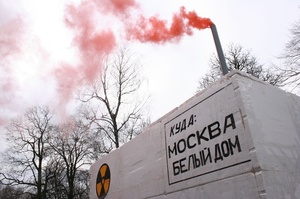
Working to discern patterns of environmental disinformation in an online world
For the past eight years, disinformation has dominated news around elections all over the world. Despite this, it is still a widely misunderstood con...
News

Publish date: June 23, 2014
News
Ecodefense, the Russian NGO, which last week became the first environmental organization to be forcibly registered as a ‘foreign agent’ by the Russian Ministry of Justice, on Friday signed a protocol protesting the new designation, its co-chair Vladimir Slivyak said on social media.
Ecodefense is the sixth NGO to be designated a foreign agent by the Justice Ministry since Vladimir Putin signed a law on June 4 granting the ministry the power to assign the foreign agent label to NGOs, supplanting the earlier demand that NGOs designate themselves to be foreign agents.
The Justice Ministry said on its official portal (in Russian) that the previous five organizations had been designated foreign agents on the strength of earlier court decisions against them compelling them to register as such.
Slivyak, however, said the situation with his organization was distinct from that approach.
Indeed, prosecutors had earlier cleared the organization during rigorous checks during 2012 of being engaged in political activity, and no court proceedings were initiated against the organization compelling it to register itself as an agent.
“Ecodefense’s circumstance are unique,” Slivyak wrote. “Earlier prosecutors’ inspections found nothing on us – yet now the Justice Ministry on its own initiative has begun proceedings to include us in the list of ‘agents’ – the first such circumstance since the new [June 4] law was signed.”

On Friday, Slivyak and Alexandra Korolyova of Ecodefense in the Russian enclave of Kaliningrad, submitted a petition to the Justice Ministry explaining the organization was not a foreign agent and the petition was turned down.
Further denied was a request for continuance of administrative proceedings against the organization so Ecodefense could first dispute in court the findings claimed by the justice ministry in its note of inspection, a copy of which Ecodefense had received last Monday and where the allegation of “political activity” and claim that the NGO was a “foreign agent” were first stated.
He said a protocol of an administrative violation was handed down, and that the group responded by writing in it that they disagreed with it and that they were not foreign agents.
“In the end, we are waiting for court,” Slivyak said.
When the news of Ecodefense’s inclusion on the foreign agent list broke last week, Slivyak chalked it up to revenge from authorities for the anti-nuclear group’s successful campaign to halt construction of the controversial Baltic Nuclear Power Plant in Kaliningrad.
“The only thing that changed between us being cleared by the prosecutors, and then declared foreign agents was the stoppage of construction at the plant,” said Slivyak, adding that the Justice Ministry told him that speaking out against the state’s plans for nuclear power was tantamount to speaking against the state in general.
Ecodefense is financed by the European Union and numerous German environmental funds, dozens of which have issued letters of support for the organization, Slivyak’s Facebook page shows.
The Austrian anti-nuclear organization Atomstopp in a statement on Tuesday called “shocking” (in German) the Russian authorities’ attempt to designate Ecodefense a foreign agent and demanded that, during their meeting with Russian President Putin – currently on a visit to Austria – Federal President Heinz Fischer and Federal Chancellor Werner Faymann “make it clear that anti-nuclear protests are legitimate.” Both President Fischer and Chancellor Faymann are “self-declared ardent opponents of nuclear energy,” the organization’s representatives said in the statement, and “can now prove how much they are behind freedom of expression […].”
“An honestly meant and convinced anti-nuclear policy cannot be sacrificed to diplomatic politeness or economic interests of some groups,” the statement said.
The foreign agent law took effect in November 2012, and required all NGOs in Russia receiving foreign funding and engaged in foggily defined political activities, to report themselves to the Ministry as foreign agents.
NGOs across the board boycotted signing up, saying the law offers no definition of what constitutes “political activity” and because the term “foreign agent” harkened back to Soviet repressions.
Alexander Nikitin, chairman of the Environment and Rights Center (ERC) Bellona, said Putin signed June 4 law because the previous voluntary self-designation as foreign agents was failing to fulfill the Russian administration’s desired quota.
“It was just becoming an embarrassment,” he said. “Now that the Justice Ministry can decide, and prosecutors are not involved, they can put anyone on the list and destroy them by dragging them through court.”

For the past eight years, disinformation has dominated news around elections all over the world. Despite this, it is still a widely misunderstood con...

A ruling by the European Free Trade Association Court that Norway’s continental shelf falls under the European Economic Area Agreement could dramatic...

Bellona held a seminar on countering Russian disinformation in the Arctic at the Arctic Frontiers international conference in Norway

Our December Nuclear Digest, reported by Bellona’s Environmental Transparency Center, is out now. Here’s a quick taste of three nuclear issues arisin...